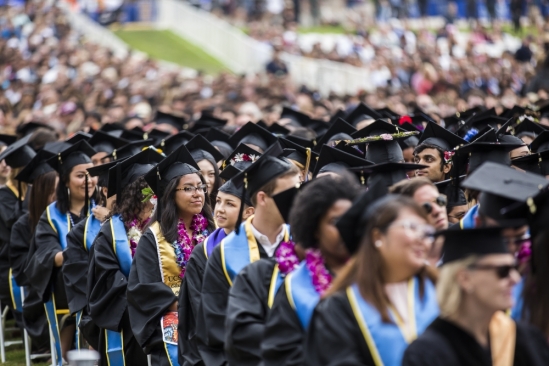Shoshana Medved
Investigative Beat Reporter
Most college students in America expect to graduate in four years. Yet recent research reveals that less than half of all students will. According to the Education Data Initiative, just 41 percent of students graduate in four years. That means a majority of college students (59 percent) are left out of the picture.
As students at UC Santa Barbara (UCSB) prepare to graduate this spring, conversations regarding commencement are back in the spotlight. UCSB’s graduation rates are higher than the national average — 75 percent of freshmen graduate in four years and 62 percent of transfers graduate in their remaining two years. However, there are still many students who take a fifth or sixth year to graduate.
Alex Valdez is a fifth-year student at UCSB. They transferred three years ago, coming in as a Psychological & Brain Sciences major.
“I knew I was probably going to have to take a fifth year when I couldn’t pass the Chemistry series required by Psych and Brain Sciences,” Valdez wrote to The Bottom Line. “[Taking the major] was too much during the pandemic and dealing with mental illness.”
Now, Valdez has happily switched to sociology. Valdez warns students that scheduling classes to graduate in four years may not be easy.
“The only stereotype I’ve really had to deal with when it comes to graduation is less about graduating and more about UCSB’s lack of planning,” Valdez said.
Across the nation, many students face similar challenges in planning courses. According to the New York Times, students often don’t realize the density of their required course loads until it’s too late.
“We asked educators to identify the biggest obstacles to a timely graduation,” Meredith Kolodner wrote in this New York Times article. “They talked about students who aim for a four-year finish but fail to take the right courses in the right order.”
At UCSB, students must take 12 units a quarter in order to be classified as a full-time student. Yet, taking only 12 units risks the possibility of delayed graduation times, as students need to fulfill 180-184 units by the time they graduate.
“You will need to take an average of 15 units a quarter after your first quarter at UCSB,” UCSB’s Schedule Planning website reads.
Planning is not the only factor at play. The National Student Clearinghouse Research Center cites the cost of education as the primary reason why students don’t graduate, with many low-income students simply dropping out instead.
“Unemployment is down. The labor market is good. Wages are rising for workers in low-skilled jobs,” Doug Shapiro, leader of the National Student Clearinghouse Research Center, said in an interview with NPR. “So if you have a high school diploma, this seems like a pretty good time to be out there making some money.”
Additionally, remedial coursework and the need to balance work and school may also mean students do not graduate in four years, according to educational consulting firm EAB. Graduating situations may vary drastically for each individual.
Valdez, though at first frustrated about major changes, has now found the fifth-year experience rewarding.
“Being a fifth-year has actually been really nice after going through a year of COVID-19,” Valdez wrote. “I’ve actually been able to participate in life here. I would tell people considering a fifth year to do it. It means you have your summer break and by the time you get to your last spring, life is basically a party.”











